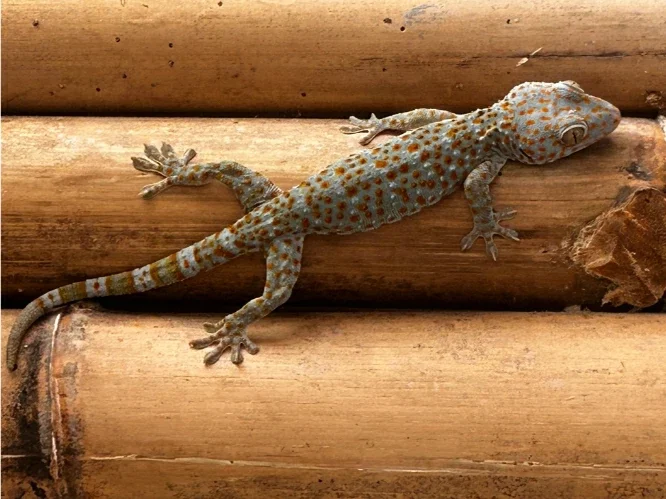You’ve probably seen a gecko dart across your walls or hanging out in your garden. They’re small, quick, and can climb just about anything, which makes them seem a little mysterious.
That sometimes makes people wonder, are these little lizards dangerous? Could they have poison or venom?
No, geckos aren’t poisonous or venomous. They don’t produce any toxins, and are harmless to humans, dogs, cats, or other pets. You can safely handle any geckos without worrying about poison or venom. Their main defenses are running away, hiding, or dropping their tail if threatened, not producing harmful chemicals. In fact, geckos are some of the safest lizards you’ll come across.
Why People Think Geckos Might Be Poisonous
A lot of people think geckos are poisonous, but that’s just a myth.
In many cultures, people believe that if a gecko falls on you or touches you, it can make you sick or give you skin problems.
These ideas are really common in different parts of the world, but they’re completely false.
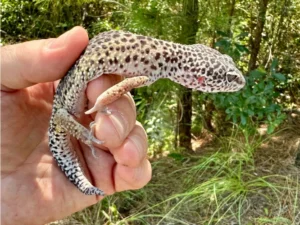
Geckos don’t have poisonous skin, and they won’t hurt you just by touching you.
Still, some people confuse geckos with other animals that actually are poisonous. For example, some frogs and salamanders produce toxins on their skin.
Because geckos look a little similar, people assume they might be poisonous too. However, geckos are lizards, not amphibians, and they don’t make toxins.
Their appearance doesn’t help either. Geckos have big eyes, sticky feet, and move really fast.
That can make them look strange or even threatening, especially if you’re not used to them.
When people feel nervous, they often assume danger, even when there isn’t any. In reality, geckos are completely harmless.
They’re more scared of you than you are of them, and they would never try to hurt you.
The Difference Between Poison and Venom
Before we go further, it helps to know the difference between poison and venom. People often mix these up, and it can cause unnecessary worry.
- Venom is a toxin an animal actively injects into another creature, usually through a bite, sting, or a special structure like a fang or barb. Snakes, scorpions, and some spiders are venomous. They have special parts that let them deliver toxins directly into their victims.
- Poison, in contrast, has to be touched, eaten, or absorbed to have an effect. Poisonous animals have toxins on their skin or in their bodies that can make you sick if you handle them or eat them. Some frogs, like poison dart frogs, have poisonous skin.
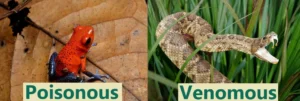 Geckos have neither poison nor venom. They don’t make toxic skin secretions, and they don’t have venom glands or fangs to inject toxins. So in this way, geckos are completely safe.
Geckos have neither poison nor venom. They don’t make toxic skin secretions, and they don’t have venom glands or fangs to inject toxins. So in this way, geckos are completely safe.
How Do Geckos Protect Themselves?
Since geckos don’t have poison or venom, they rely on other ways to stay safe.
The first thing they do is run. Geckos are incredibly fast. They can quickly climb walls, slip into tiny cracks, or even run upside down across ceilings where predators can’t follow.
Their sticky toe pads make moving in tricky spots easy.
Many geckos can also drop their tails when they feel threatened. This is called tail autotomy.
If a predator grabs a gecko by the tail, the tail breaks off and keeps wiggling to distract the predator while the gecko escapes.
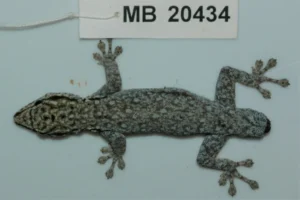
The tail will eventually grow back, though it often looks different from the original.
Camouflage is another way geckos hide. Many species can blend into their surroundings, making it hard for predators to see them. Some geckos can even slightly change their color to match the area they’re in.
Some geckos also try to look scary by opening their mouths wide, hissing, or puffing themselves up. That’s all bluffing.
They can’t actually hurt a predator,they just hope it will leave them alone.
Are Any Lizards Poisonous or Venomous?
Even though geckos aren’t poisonous or venomous, a few other lizards are.
The Gila monster and the Mexican beaded lizard are the only two venomous lizards in the world.
They have venom glands in their lower jaw and special grooved teeth to deliver venom when they bite.
But these lizards are big, slow, and live only in certain parts of North America. They don’t look or behave anything like geckos.
No lizards are known to be poisonous like some frogs or toads. Even the venomous lizards inject their toxins with bites, they don’t have poisonous skin.
Geckos are in a completely different family and don’t have any toxins at all. You can handle any gecko species without worrying about poison or venom.
Can You Get Sick From Touching a Gecko?
There is one health concern to know about when handling reptiles.
Geckos, like many reptiles, can carry salmonella bacteria. That doesn’t mean the gecko is dirty or sick. Salmonella is just part of their natural environment and doesn’t harm them.
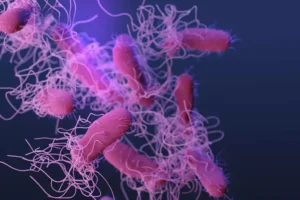
You can get salmonella if you touch a gecko and then touch your mouth, eat, or touch your face without washing your hands first.
Washing your hands thoroughly after handling reptiles removes almost all risk.
Salmonella infections can cause stomach cramps, diarrhea, and fever. Kids, older people, and anyone with a weak immune system are at higher risk for serious illness.
The good news is it’s easy to prevent. Wash your hands after touching a gecko or anything it’s been near.
Don’t let geckos crawl on surfaces where you prepare food, and don’t touch your face while handling them.
Are Geckos Dangerous to Pets?
Geckos aren’t poisonous or dangerous to dogs, cats, or other pets.
If your pet catches a gecko, it won’t be poisoned because the gecko has no toxins. The main risk is if your pet tries to swallow the gecko whole, which is rare.
Actually, the gecko is in much more danger than your pet. Cats especially love hunting small lizards, and geckos caught by cats usually don’t survive.
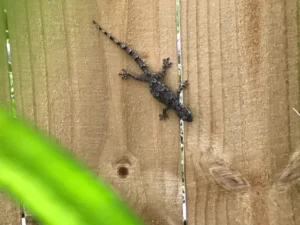
That said, geckos can carry salmonella, which could pass to pets if eaten. Most healthy pets have stomach acids strong enough to kill the bacteria, but it’s still possible.
Some geckos also carry parasites, which is another reason to keep pets away.
The safest approach is to keep pets and geckos apart. The gecko isn’t a toy, and your pets stay safe from small health risks.
The Benefits of Having Geckos Around
Geckos aren’t poisonous, and they’re actually helpful around your home.
They’re excellent at controlling pests. Geckos eat mosquitoes, flies, moths, cockroaches, and other insects. A single gecko can eat dozens of bugs every night.
In tropical regions, where mosquitoes can carry diseases like dengue or malaria, geckos help keep insect numbers down. Homes with geckos have far fewer insect pests.
Geckos are also clean. They don’t make nests, leave much waste, or damage property. Unlike rodents, they won’t chew wires or get into food.
Having geckos in your home is a sign of a healthy environment. They stay where there’s food, so if you have geckos, it means insects are around. Once insect numbers drop, gecko numbers balance out naturally.
How to Safely Handle a Gecko
Since geckos aren’t poisonous, you can handle them safely if needed.
Approach slowly and calmly. Quick movements scare them, and a scared gecko might drop its tail or try to bite (though bites hardly hurt).
Gently cup your hands around the gecko or let it walk onto your hand. Support its whole body. Don’t grab the tail. Pulling on it stresses the gecko and may cause the tail to break off.
Handle geckos for a short time. Even though they aren’t poisonous, oils, lotions, and other substances on your hands can possibly harm them.
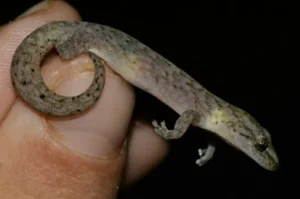
After handling, wash your hands with soap and water. This protects you from bacteria, even though the gecko itself isn’t poisonous.
If you have pet geckos, get them from a trusted breeder and have a vet check them. Healthy geckos make great pets and are completely safe to keep in your home.
Frequently Asked Questions
No, geckos do not have poison.
Geckos are harmless reptiles and don’t produce any toxic substances in their skin or body that could hurt humans, dogs, cats, or other pets. They rely on their quick reflexes and camouflage to stay safe, not poison.
Do geckos have venom?
No, geckos do not have venom. Unlike some snakes or lizards, geckos don’t have fangs or venom glands, and they can’t inject any toxins. They’re completely safe to touch or keep as pets, and their bites are very minor if they happen at all.
Conclusion
Geckos don’t have poison or venom. They’re harmless lizards that use speed, blending in, and tail dropping to defend themselves.
The myths about geckos being poisonous come from fear, not facts. You can safely handle geckos, let them live in your home, and enjoy how they help control insects.
The only real health concern is salmonella, but that’s easy to avoid by washing your hands.
So if you see a gecko in your home or garden, don’t worry. These little lizards are friendly helpers, keeping your home free of mosquitoes and other annoying insects, all without a drop of poison in their bodies.
Hi, my name is Ezra Mushala, i have been interested animals all my life. I am the main author and editor here at snakeinformer.com.

